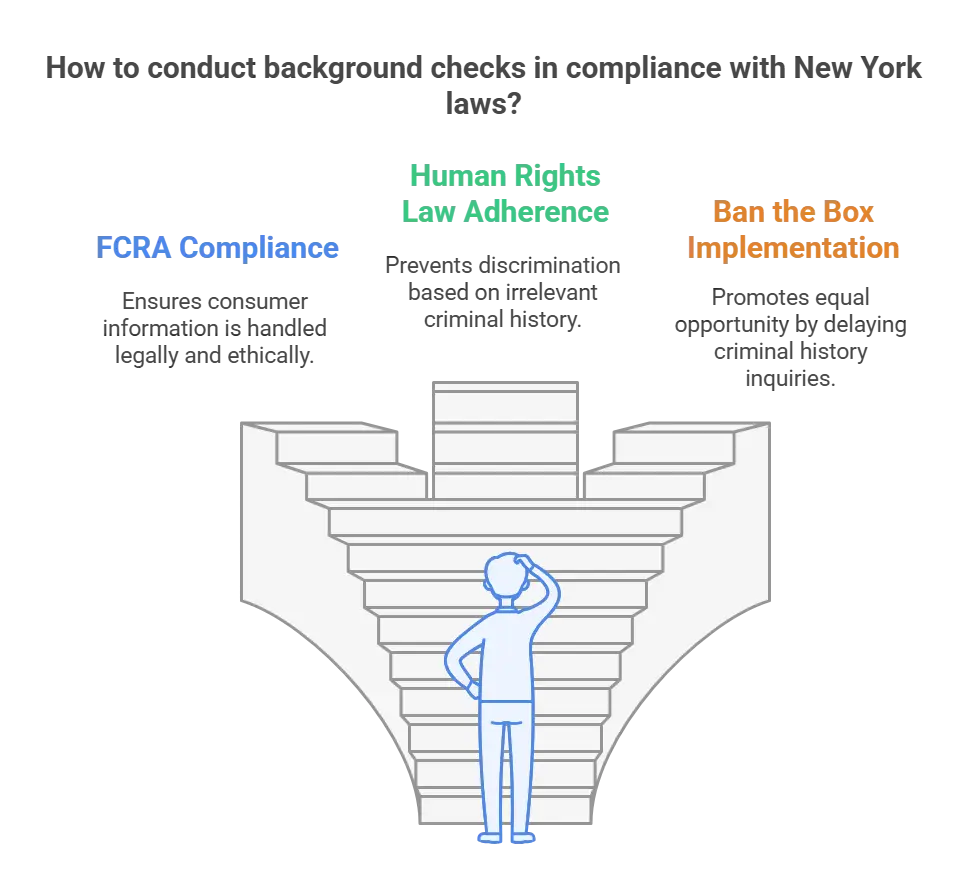Navigating the contractor background screening process in New York can be tricky, especially with the legal obligations and varying requirements involved. Whether you're a business looking to engage contractors or an individual contractor preparing for background checks, understanding the process is crucial. This guide will break everything down for you, keeping it straightforward and informative.
Key Takeaways
- Background screening is essential in New York hiring, ensuring safe and trustworthy work environments.
- These screenings help verify identities and histories, often including criminal records, past employment, and credit scores.
- In New York, legal frameworks like the Fair Credit Reporting Act and "Ban the Box" laws guide the background check process.
- Employers and contractors should clearly understand their roles and maintain transparent processes when conducting background checks.
- A significant percentage of employers use background screening, with results often influencing hiring decisions and occasionally revealing discrepancies.
Introduction
Background screening is no longer just a box to tick off; it's a cornerstone of hiring in New York. Employers lean on these checks to safeguard their businesses and to ensure a trustworthy environment. For contractors, understanding these screenings isn't just beneficial—it's necessary to pave the way for successful gigs. This guide is here to break down the details, aiming to make this complex process a bit less daunting for both parties involved. If you're gearing up to hire or be hired, knowing what lies ahead is half the battle won.
Data and Statistics
When looking at employment background checks, recent numbers hint at the workings under the surface. Over 90% of employers reportedly use background checks as part of their hiring process. This isn't just about ticking boxes; it's about vetting for trust and safety in the workplace. It's like flipping through someone's history book before signing them onto a new chapter.
Not all checks lead to clear conclusions, though. Around 30% reveal discrepancies between what a candidate claims and what's unearthed in the report. Whether these differences are minor or significant can sway hiring decisions. For those wondering about outcomes, failing a background check isn't as frequent as one might fear. Most applicants clear this hurdle, easing into their new roles once the paperwork is settled.
In hiring circles, background checks have quite the influence. Data suggests they alter the course of hiring decisions in nearly 50% of cases. Think of these checks as that subtle but firm nudge, directing a company toward a candidate or away from them, sculpting the workforce one check at a time.
Understanding Background Screening
So, what exactly goes into a background screening? It's essentially a way to verify the identity and check the history of individuals involved. When it comes to contractors, these checks are a tool to ensure you’re dealing with reliable professionals. This process can involve looking at criminal records, confirming past employment, and even checking credit scores in some cases. Such checks are not just red tape—they're about ensuring everyone plays it straight, making them a practical step for businesses that value safety and compliance.
Legal Framework for Background Checks in New York
When it comes to background checks in New York, there is a web of legal requirements you need to keep in mind. At the forefront is the Fair Credit Reporting Act (FCRA), a federal law that sets standards on how consumer information is collected and used during background checks. It mandates that employers must notify individuals in writing before obtaining a background report and secure their consent.

Then there's the New York State Human Rights Law, which prohibits discrimination based on arrest records and convictions unless directly related to the job. This means you need to weigh whether any discovered criminal history is relevant to the position.
The “Ban the Box” legislation is another key consideration. This law bars employers from inquiring about an applicant’s criminal history on initial job applications. Employers can only look into this after making a conditional offer. It’s aimed at providing fair chances to those with past convictions, focusing first on qualifications rather than criminal records.
Compliance with these regulations isn’t just a legal obligation but a necessity to avoid penalties and lawsuits. You must ensure that your background processes are clear, non-discriminatory, and transparent, which often means consulting legal counsel to align with both federal and state laws. Taking these steps creates a fairer hiring process and promotes trust in the process.
Conducting a Contractor Background Check
When it comes to contractor background checks, both employers and contractors have specific roles to play. For employers, it's about creating a reliable process, while contractors must prepare to present themselves transparently.
Steps for Employers
Define Screening Policies: Kick things off by drafting internal policies that fit within legal guidelines. This helps set the tone for consistency and fairness in how checks are conducted.
Choose a Background Check Provider: Select a trustworthy service to handle the checks. Look for a provider with a solid track record, good reviews, and transparent pricing. They should also stay compliant with state and federal laws.
Get Consent: Before you do anything, get written permission from contractors. This isn't just a formality—it's a legal requirement. Make sure the consent form is clear about what checks will be done.
Review Results: Once you get the results, you'll need to interpret them. This isn't always straightforward, but focus on the relevance of findings to the contractor's job role. Some red flags might disqualify a candidate, but others could be less significant.
Tips for Contractors
Preparing for a Background Check: Make sure your paperwork is in order. Have your personal documentation ready, like identification and employment history. This tells potential employers you're organized and proactive.
Disclosure of Past Issues: If you've had legal issues in the past, honesty is the best policy. Be upfront about them and be ready to explain what you've learned. This openness can work in your favor, showing personal growth and integrity.
Both employers and contractors need to understand their roles in the background check process in New York. By setting clear policies and approaching the process with transparency, both parties can meet the necessary requirements with minimal hassle.
Frequently Asked Questions (FAQs)
Do a misdemeanor rule you out of a job in New York?
The impact of a misdemeanor varies widely, depending on the company's policies and the nature of the offense. Some firms may overlook minor infractions, while others could be more strict.
How long does the background check process take in New York?
Typically, you’d look at about three to five business days, but this can stretch longer if records are hard to access or if more detailed checks are needed.
What should I do if there is a mistake on my background report in New York?
If you find a mistake in your background report, address it quickly. Begin by identifying inaccuracies and gather any supporting documents. Then, contact the background check company to dispute the errors. They are obliged to investigate and rectify any genuine mistakes. Knowing your rights and being proactive can make this process smoother and ensure your record reflects the truth.
Future of Employment Background Checks
Background checks have become a staple in employment, acting as a safeguard in hiring processes. They allow companies to validate potential hires, ensuring that workplaces are both safe and productive. In industries where trust and security are paramount, these checks can determine access to sensitive roles or data.
The job market today is seeing a few hurdles. While talent pools expand, the hiring process becomes more complex, partly due to increased scrutiny and heightened competition for roles. Employers are now more thorough, considering not just qualifications but character and history too. As a result, background checks have grown in prominence, often tipping the scales in hiring decisions.
Looking ahead, technology is poised to reshape how background checks are done. Automated systems and artificial intelligence promise faster, more accurate assessments. Legislative changes, like potential shifts in privacy laws, may also alter the landscape, necessitating adaptations from employers and contractors alike. It's key for both parties to stay informed and adaptable as these changes unfold.
Conclusion
Recapping what we’ve covered, the guide outlines the nuts and bolts of contractor background screenings in New York––from understanding its necessity, to navigating complex legal frameworks, and following through with practical steps for both employers and contractors. Keeping an eye on emerging trends and adapting to legislative shifts will ensure that everyone remains compliant and informed.
For employers, it's about crafting clear policies and choosing trustworthy service providers. For contractors, knowing what to expect and owning one's personal history are key. Both parties should approach the process with transparency and positivity, recognizing its role in promoting a secure work environment.
Ready to start? Employers might begin by reviewing their internal screening policies, while contractors could gather necessary documents in anticipation of checks. If you're looking for more insights, don't hesitate to visit our blog or explore the toolkit for more guidance on conducting thorough background checks.
Additional Resources
- EEOC. (2020). Background checks: What employers need to know. Retrieved from https://www.eeoc.gov/laws/guidance/background-checks-what-employers-need-know
- New York State Department of Labor. (n.d.). Labor laws and regulations. Retrieved from https://labor.ny.gov/laws-and-regulations
Definitions
Background Screening: Background screening is a process employers use to confirm the identity and review the history of potential hires or contractors. This comprehensive assessment may include checking criminal records, verifying past employment, and, in some cases, examining credit reports. The purpose is to ensure that candidates meet the company's standards for trustworthiness, compliance, and suitability.
Fair Credit Reporting Act (FCRA): The Fair Credit Reporting Act is a federal law that governs how consumer information is collected, shared, and used during background checks. It requires employers to notify individuals in writing and obtain their consent before requesting a background report. The law also ensures individuals have the right to dispute inaccuracies and mandates transparent use of consumer data during hiring processes.
Ban the Box: "Ban the Box" refers to legislation that prevents employers from including questions about criminal history on initial job applications. In New York, the law requires employers to delay inquiries about an applicant's past convictions until after a conditional job offer is made. The aim is to provide individuals with prior convictions a fair chance by initially focusing on qualifications rather than their record.

GCheck Editorial Team
Meet the GCheck Editorial Team, your trusted source for insightful and up-to-date information in the world of employment background checks. Committed to delivering the latest trends, best practices, and industry insights, our team is dedicated to keeping you informed.
With a passion for ensuring accuracy, compliance, and efficiency in background screening, we are your go-to experts in the field. Stay tuned for our comprehensive articles, guides, and analysis, designed to empower businesses and individuals with the knowledge they need to make informed decisions.
At GCheck, we're here to guide you through the complexities of background checks, every step of the way.





